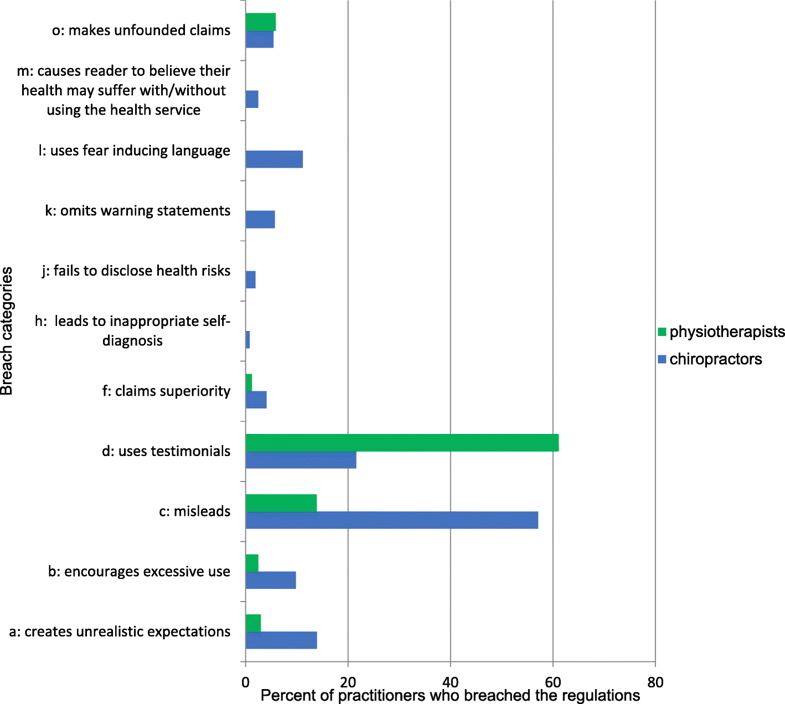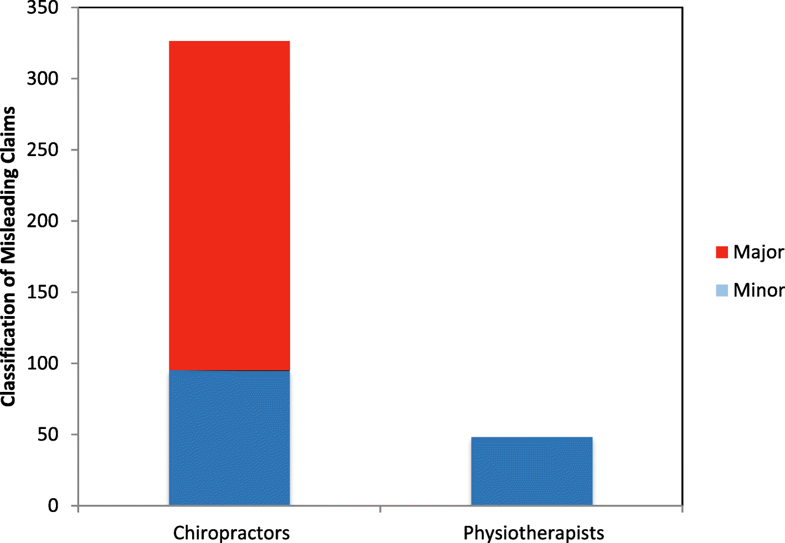In 2010, we published an investigation which revealed that the majority of chiropractors and their associations in the English speaking world seem to make therapeutic claims that are not supported by sound evidence, whilst only 28% of chiropractor websites promote lower back pain, which is supported by some evidence. If you go on the Internet (or just study this blog), you can easily see that the advertising of chiropractors is still far from adequate. Recently, a researcher investigated this issue systematically.
The aims of this survey were to determine the frequency, type and nature of at-risk advertising by Australian chiropractors and physiotherapists and whether there is a correlation between professional association membership and advertising guideline compliance. A cross sectional audit examining practitioner advertising was performed on representative samples of Australian chiropractors and physiotherapists. Two auditors examined advertising by 380 physiotherapists and 359 chiropractors for material potentially in breach of the regulatory authorities’ advertising guidelines. The advertising appeared on practitioner websites and linked Facebook pages.
Two-hundred and fifty-eight (72%) audited chiropractors and 231 (61%) audited physiotherapists had breaches of the Advertising Guidelines on their websites and linked Facebook pages. The frequency of breaches by chiropractors was higher. The type and nature of the breaches by chiropractors was potentially more harmful. Membership in a professional association influenced neither the frequency nor the severity of breaches with chiropractors.
 The nature (top graph) and the severity (bottom graph) of the false claims.
The nature (top graph) and the severity (bottom graph) of the false claims.
 The author (who is affiliated with the Murdoch University, School of Chiropractic, Murdoch, Australia) concluded that advertising breaches were common in both samples even though regulators and professional associations provide practitioners with explicit information on how to comply with advertising guidelines. Breaches by chiropractors were more numerous and more serious due to their greater potential to lead consumers to make inappropriate and potentially harmful healthcare decisions.
The author (who is affiliated with the Murdoch University, School of Chiropractic, Murdoch, Australia) concluded that advertising breaches were common in both samples even though regulators and professional associations provide practitioners with explicit information on how to comply with advertising guidelines. Breaches by chiropractors were more numerous and more serious due to their greater potential to lead consumers to make inappropriate and potentially harmful healthcare decisions.
In the discussion section of the paper, the author makes this important comment:
The chiropractic findings are of major concern for two reasons, the first being public safety. Society expects and accepts that professionals advertise their services to assist consumers in making informed choices. To meet societal expectations and legal obligations, advertising must be socially responsible, truthful, appropriate and not misleading or deceptive. Advertising that fails to meet these expectations has the potential to harm. To assist practitioners in fulfilling their obligations, regulators formulated specific rules about advertising of health services to protect the rights of consumers however the data indicate that both professions and chiropractors in particular are not fulfilling their obligations.
The second reason is the high percentage of chiropractors advertising in an unacceptable manner. This raises questions about the profession’s culture and understanding of its obligations under the social contract. It is beyond the scope of this paper to examine this; however, this topic has been the subject of papers by observers both within the profession and external to it over several decades. The consensus is, although the profession has many of the trappings of a mainstream healthcare provider, (legislative recognition, high utilization rates, growing global footprint etc.), it is lacking in other key areas such as civic professionalism and upholding the social contract, both of which are critical components within health care. This research reinforces that position.
You might say that the findings of this investigation apply only to Australia. This is true, of course, but I see so much nonsense in advertisements by chiropractors from any country, that I very much doubt that elsewhere the situation is any better.

I must admit that the physiotherapists’ results surprised me but my only experience with them is at a university clinic. The presence of physiotherapists & chiropractors together in main street clinics probably should have alerted me.
The “education” debt, office expenses and advertising etc disallow most chiroquackers from full-disclosure and honesty i.e. “Mrs. Smith there are no “health” benefits to spinal-adjustments, half my patients may feel somewhat worse afterwards, most of my “therapies” are available online, and time or much less expensive alternatives work as well. And I may accidentally OR purposely give you the erroneous suggestion “regular” use of my services may prevent further pain or have important “wellness” benefits. Your co-pay and deductible will require you pay $45-80usd each treatment….and much of the time my treatments may last less than 2minutes….When would like to begin?”
IF there is any REAL benefits to having chiroquackery available…or a profession that faffs about on the spine searching for a chimera….elimination of the $200,000 6 year “education” MUST be the starting point. These clown-colleges can’t be allowed to produce zero pertinent research, adopt and co-opt non-chiropractic interventions, be unrepentant regarding their chameleon attributes and continue to solicit gullible wannabe “doctors” who could have gone to a real university and pursued a viable and fruitful career. One they could have real pride in having achieved. Chiropractic: “we believe it’s a sin to let a sucker keep his money”. Carpet bombs are most effective when attacking such targets.
Quoted: “Two-hundred and fifty-eight (72%) audited chiropractors and 231 (61%) audited physiotherapists had breaches of the Advertising Guidelines on their websites and linked Facebook pages. The frequency of breaches by chiropractors was higher. The type and nature of the breaches by chiropractors was potentially more harmful. Membership in a professional association influenced neither the frequency nor the severity of breaches with chiropractors.”
Shocking.
Can’t wait to hear from the quackers.
This paper was shared in a couple of my groups a few days ago. I will repeat here what to told them.
Follow the rules. If you dont like some of the rules, work to change them. Until they are changed, follow the rules.
Keith Simpson who wrote the paper has authored several papers on this topic and is a vocal critic of the BS within the chiropractic profession. He is very thorough. Good paper.
I worked for Keith in the early 1990’s in Brisbane before he moved to Perth to work at Murdock University. He ran a very good multimodal/multidisciplinary, rehab focused clinic.
Out of curiosity we had a look at the websites of the physio’s on their registration board three years after the rules on testimonials came out and three were not compliant. We pointed it out on social media to the critics who were hammering chiropractors and with weeks all three quietly removed the testimonials without comment from anyone including the critics.
What will be interesting is that the national registration board (AHPRA) that regulates all professions informed us late last year that a pilot audit of chiropractors and dentists would be carries out early this year. It will be interesting to see if their results match Keith’s findings.